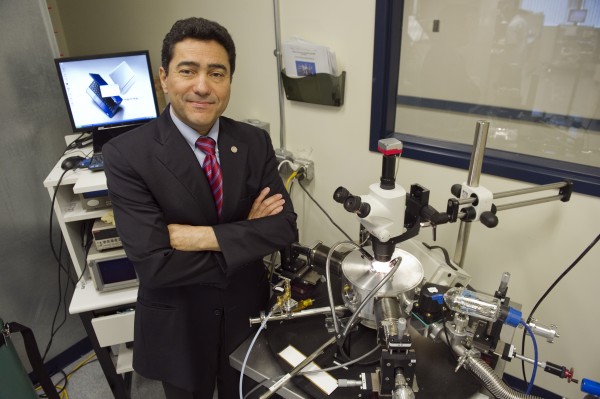A nano approach to maintain manufacturing momentum

For the last 60 years, innovation has been central to fostering the nation’s economic growth, and American manufacturers have been its drivers. In order to maintain this momentum in the midst of an increasingly tenuous economic climate, the nation must work to promote a vibrant manufacturing sector, according to Ahmed Busnaina, the William Lincoln Smith Chair Professor in the College of Engineering.
Earlier this month, some 70 researchers and stakeholders from more than 20 organizations in academia, industry and government convened at Northeastern to discuss the future of nanoscale manufacturing.
Hosted by Northeastern’s NSF Nanoscale Science and Engineering Center for High-rate Nanomanufacturing, the event featured presentations from representatives from CHN; the Naval Research Laboratory; the U.S. Army Research Laboratory; NASA and Raytheon. In their presentations, experts identified high-priority needs including new specialized materials such as electronics, sensors, energy harvesting and storage in addition to lightweight nanocomposites for stronger, lighter aircraft wings and shielding.
Busnaina, director of CHN, noted that the group is trying to answer the question, “How can we get nanomanufacturing to enable new products that are stronger, lighter and faster than current technologies?” Overcoming such challenges, he added, could lay the foundation for new industries and provide jobs through the development of a new workforce.
CHN’s novel manufacturing technology could print 2-D and 3-D nanostructures at room temperature and pressure, on hard or flexible surfaces. It’s chemical-free, material-independent and needs very low energy to operate.
While Busnaina is committed to CHN’s novel approach, he said the workshop was meant to encourage collaboration among researchers and across platforms.
After the morning sessions, representatives from local nanotech companies conducted ideation sessions in order to articulate a strategy to advance and accelerate moving technologies from the lab to industrial applications.
“This nanomanufacturing workshop will help industry, government, CHN and partners to address current developments, successes and challenges in transitioning research into commercial products,” Mel Bernstein, senior vice provost for research and graduate education, told attendees in his opening remarks. “The goal is to craft a strategy to move nanotechnology from the laboratory to industry-floor manufacturing.”





